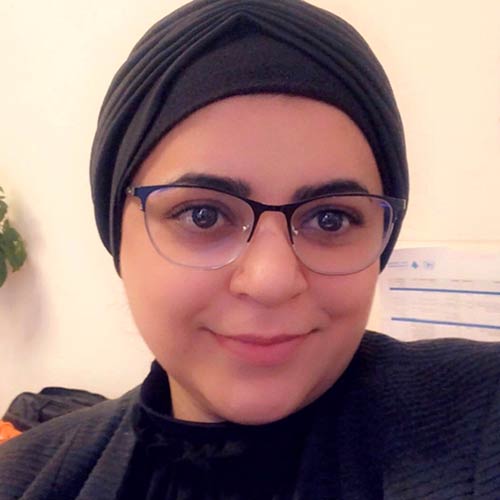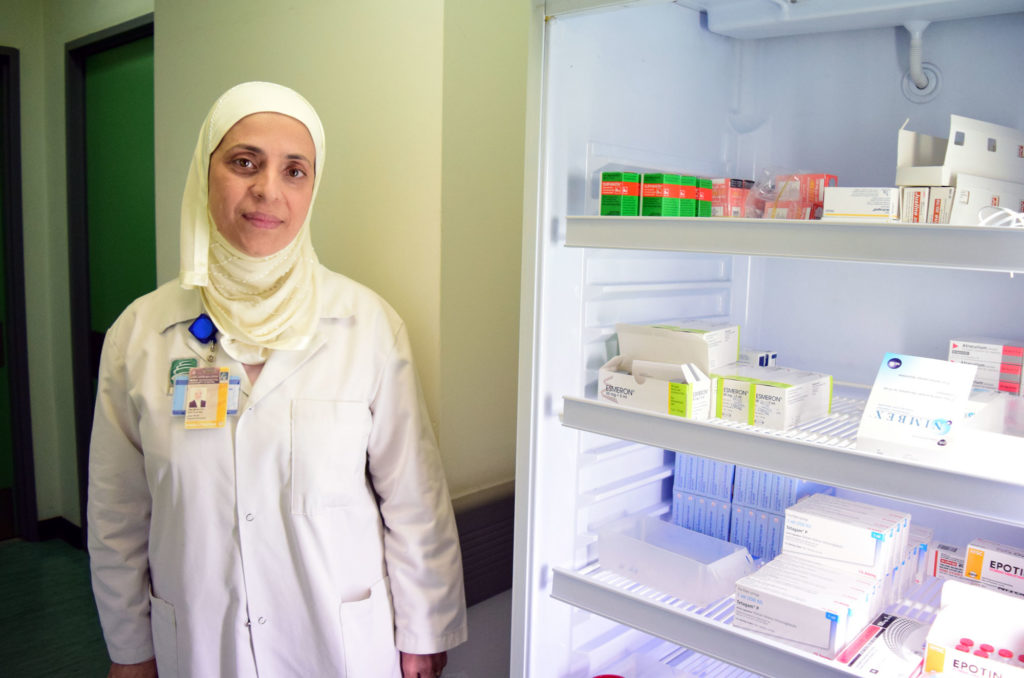Women on the Frontlines of Healthcare in Lebanon
Posted in: Life in the Middle East, Society & culture
Lebanon’s economic crisis has only gotten worse, fueled by political hegemonies and corruption and mismanagement of resources, and further inflamed by the widespread protests against the regime, the Beirut port explosion, and finally the pandemic. The COVID-19 outbreak deepened the economic crisis, leaving the country indebted, facing inflation, and a dramatically devalued Lebanese lira.
Women are pivotal figures in combating the pandemic as frontline responders, working as home caregivers, nurses, doctors, social workers, pharmacists, and other healthcare professionals. Lina Atat, Anera’s medical donations program manager in Lebanon, says,
“Many women are key frontline workers against COVID-19. We know from the WHO that seven out of 10 health industry workers worldwide are women. In Lebanon, 80% of the registered nurses are women, and 18% of the government’s inter-ministerial committee on COVID-19 are women. Then too, many of the national professional health associations leading COVID response and many UN agencies and international NGOs supporting Lebanon on COVID are headed by women.”


“March marks the month for celebrating women’s history and International Women’s Day,” Atat notes.
“This year we are celebrating the incredible contribution of women to the COVID-19, and standing against the harsh economic situations families in Lebanon are passing through. Women symbolize selfless giving, endurance, and perseveration.”
To commemorate these women, we recently spoke with two of these women on the frontlines of healthcare delivery serving their communities in Lebanon.
Hiba Al Rayes is executive director of the Health Care Society in Lebanon, which was founded in 1995 to provide quality health care for Palestinian refugees. Although she had originally studied economics and began her career working in financial services, she decided to switch careers.
“After the 2006 war with Israel, I felt extremely disengaged from the region and alienated from my job. So I decided to study public health, and later on medicine.
“I met my husband who was in the US at the time, and I knew that would bring me back to the Middle East. I completed my medical training at AUB, and I decided I wanted to work in humanitarian aid.”
Through her leadership of the Health Care Society, she has been providing essential health services to vulnerable communities. Dr. Al Rayes says the unprecedented financial crisis gripping Lebanon has made it difficult to sustain the donations that the organization relies upon, imperiling its financial security. Fortunately women like Al Rayes have shown not only solidarity with marginalized groups, but also their resilience in the face of extreme adversity.
Yet women face unique challenges in the workplace, even within humanitarian-oriented spaces. To overcome this, they have worked harder to help ensure that more women join organizations and take on leadership roles.
Raeda Bitar is the chief pharmacist at Rafik Hariri University Hospital. Attentive readers may remember her from some of our past stories. She shares an example of the biases women face on the job.
“A colleague of mine was the de facto person to direct and manage the hospital when the director was busy. There were also several other women holding managerial roles. Despite their great jobs, some of our male counterparts would mockingly say how the hospital is going to collapse at the hands of women. Such stories show how patriarchal thinking still perseveres. Women actually have proved themselves by working harder, staying late, and overperforming, proving that these comments are uncalled for.”


The patriarchal framework extends to the intellectual, political, socioeconomic, and certainly legal systems of the country, and so women face obstacles and challenges with this system. Women have had their wages reduced, their working hours maximized, and are still able to withstand the overbearing conditions of this crisis. Working women were also subjected to taking up more responsibilities in unpaid care, have lost work opportunities, and have significantly lower income rates than men.
Perhaps the most common challenge is disrespect from coworkers that fits into a pattern of patriarchal beliefs and habits.
AlRayes says,
“As a woman working in this field, I am faced with individuals who don’t think of me as a doctor, simply because I am a woman. To combat this, I always refer to myself as a doctor, since other male doctors mistakenly (or knowingly) refer to me as ‘madame’ instead.”
As Atat says, “Despite all the challenges, women contributed to alleviating the impact of the virus on the national community. That says it all!”
Women are also constrained socioeconomically by the need to balance their familial and professional lives.
Dr. Bitar says,
“I only have one child, but the idea of having more children would burden me as I would not be able to continue working or managing the household. When my child had to revert to online learning, I faced difficulties helping him study. He’s 8 years old now and requires attention, but I also have a demanding job, so it’s hard to balance both.
“I am grateful for my extended family, who are always willing to help tutor or care for my child during my working hours. Family is really important and helps support working women.”
Women are often most affected and subject to additional challenges because of their gender. Refugee women face even more challenges in their own double crisis, first as a resident of Lebanon, and second as a refugee with limited access to services and rights.
At the same time, the current crisis has cast a spotlight on women’s resilience and empowerment and their contributions to the process of repair and rebuilding in the crisis-struck country.
The ongoing tribulations impacting all communities in Lebanon have been relieved by the women at the frontlines of the fight against COVID-19 and the wider public health crisis.
Al Rayes says,
“In the medical and humanitarian fields, women bring their empathy and ability to comprehend the larger situation without losing sight of the individual home and familial needs of our patients. In this way, women make an impact when it comes to helping refugees in Lebanon.”
We pay tribute to the women who have stood tall and persevered in the face of these crises, mitigating the pandemic while working to improve social, economic, and gender equality.
Bitar says,
“The economic situation has really affected the medical field, and the brain drain is at an all-time high. Most pharmacists I know have either left or are in the process of preparing for their eventual departure. Some specialists are under huge pressure because their colleagues have emigrated. I couldn’t find a neurosurgeon for children last week because there was only one operating across six or seven different hospitals.”
During the last couple of years, women have had to work harder and are under more pressure, they need to be strong for their families and safeguard their health, as well as continue working for their communities through humanitarian organizations, which has become necessary during the tumultuous period. Women are active in these initiatives, partaking in the organization and management of grassroots responses through new organizations set up to fill in the gaps of the government in order to improve living conditions for marginal and vulnerable communities.
Dr. Al Rayes says her favorite thing about her work is “seeing how I can help relieve stress from the lives of my patients by providing treatment, medication, and financial services.”
OUR BLOG
Related
In Gaza, systematic bombardment of civilian housing and infrastructure has created a crisis of shelter that is endangering over a million.
The undersigned members of the Association of International Development Agencies (AIDA) urgently call upon the international community to intervene and halt settler attacks targeting Palestinian civilians and protect Palestinian communities near illegal settlements. The International NGO Community urges international actors…

